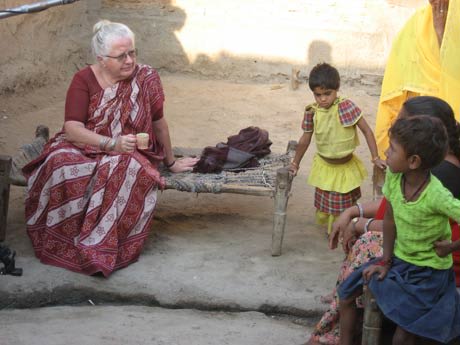Everyone who saw Deepa Mehtas Water was given a crash course in the concept of "the widows house, where the wives of deceased Hindu men are sent to live out their days in isolation and neglect. Now her brother Dilip updates us on the phenomenon of 40 million women who live in the shadows, and what he lacks in documentary skills he more than makes up for with conviction.
Where Water was very much a streamlined story with some awkward characterisations, theres no explaining the vast subtleties of these womens oppression: how they are stripped of their possessions by their families, blown off into loneliness and poverty, and basically left to fend for themselves. Mehta makes the mistake of mostly letting advocates speak for the widows one wishes for a more ground-level view of this suffering rather than the spectacle of humiliated women with running commentary. Theres also a bit of structural timidity in its "pick a topic, run it down, move on approach one cries out for a more eloquent way of stating the question.
Still, the film is extremely thorough, and extremely upsetting, in its explication of all the Byzantine ways the subjects are put through hell. And its just as thorough in showing the thin line of private citizens who will step in to help the widows when the government and social mores prove inadequate to the task.
If you want a 50s problem picture, Water is the way to go, but this is the movie to see if you want a more nuanced approach to the shameful phenomenon at hand.
(Mongrel Media)Where Water was very much a streamlined story with some awkward characterisations, theres no explaining the vast subtleties of these womens oppression: how they are stripped of their possessions by their families, blown off into loneliness and poverty, and basically left to fend for themselves. Mehta makes the mistake of mostly letting advocates speak for the widows one wishes for a more ground-level view of this suffering rather than the spectacle of humiliated women with running commentary. Theres also a bit of structural timidity in its "pick a topic, run it down, move on approach one cries out for a more eloquent way of stating the question.
Still, the film is extremely thorough, and extremely upsetting, in its explication of all the Byzantine ways the subjects are put through hell. And its just as thorough in showing the thin line of private citizens who will step in to help the widows when the government and social mores prove inadequate to the task.
If you want a 50s problem picture, Water is the way to go, but this is the movie to see if you want a more nuanced approach to the shameful phenomenon at hand.




